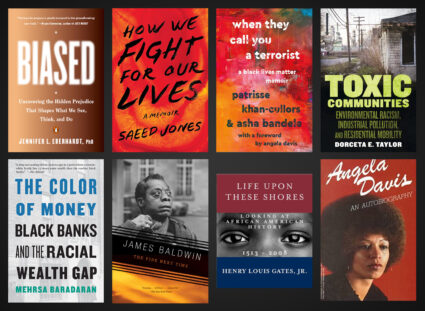
A federal panel reviewing President Donald Trump's plans to build a ballroom at the White House has set April 2…

As protesters take to the streets to speak out against police brutality and systemic racism long endured by black people in the United States, during a pandemic that disproportionately affects communities of color, the myriad consequences of institutional racism is a matter of national conversation and reflection.
In this moment, many non-black people are seeking to educate themselves about the experiences of black Americans and what actions everyone — but specifically, white Americans — can take to dismantle their own racial biases, as well as the larger discriminatory social, political and economic power structures that shape the nation.
Books, podcasts, films, articles and other resources can serve as a starting point for people who wish to become better allies in the fight for racial justice and equality by engaging with the work of black writers and scholars, learning about intersectional forms of oppression in the U.S. and actively educating their friends and family on these topics. Talking with some of the voices featured on the PBS NewsHour, as well as sharing some of our own recommendations, we've compiled a list of things for you to read, listen to and watch that might illuminate your understanding. This list is just a starting point.
READ MORE: Go beyond Toni Morrison with these 7 books that stare down the white gaze
Broken Justice is a PBS NewsHour original podcast series that looks at the impact that overworked and underfunded public defenders have on the American criminal justice system. It tells the story of Ricky Kidd, who was sentenced to life without parole for a double homicide he says he didn't commit and argues his court-appointed lawyer is the reason for that conviction.
Code Switch is an NPR podcast created by "a multi-racial, multi-generational team of journalists" that covers "overlapping themes of race, ethnicity and culture, how they play out in our lives and communities, and how all of this is shifting."
1619 is a podcast series from New York Times journalist Nikole Hannah Jones that connects "past and present" by examining "the long shadow of American slavery."
Say It Loud is "a PBS Digital Studios series that celebrates Black culture, context, and history."
"13th," available both on Netflix and YouTube, is a documentary from director Ava DuVernay that looks at the U.S. prison system and "how the country's history of racial inequality drives the high rate of incarceration in America."
Charlayne Hunter-Gault, Candice Norwood, Bakari Sellers and Tonya Alston contributed recommendations to this list.
13-year-old founder of #1000blackgirlbooks shares some of her favorite reads
10 books besides 'To Kill a Mockingbird' that tackle racial injustice
10 children's books that feature diverse characters
Sustain our coverage of culture, arts and literature.